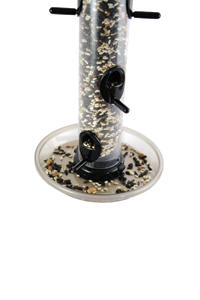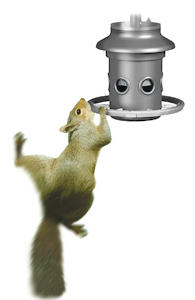Feed Birds, Not Rodents
One of the concerns we hear sometimes is that feeding birds will bring rodents. But, done correctly, bird feeding will not attract rats and other unwanted critters. In fact, feeders almost never are the original source of a rodent problem. Nevertheless, there are easy ways to make sure your feeders don't contribute to the problem.
Before You Put up Your Feeders:
* Remove shelter for rodents: Potential problem sites around your home include openings in buildings, brush and debris piles, stacked wood, and thick patches of ivy and other ground covers.
* Prevent access to food sources: Place bird feeders where you can watch them, so, if rodents are there, you will see them quickly. Further, make sure rodents cannot access garbage, stored birdseed, pet food, dog waste, BBQ grills, vegetable gardens and fruit trees.
When You're Ready To Put Up Feeders, Two Steps to Success
#1: Keep Rodents off the Feeders: A freestanding pole with a baffle is the most comprehensive approach. Simple baffles can be attached to almost any pole. You also can have multiple feeders hanging from a baffled single pole. Fortunately, rodents are poor jumpers and are deterred by only a few feet of clearance around the pole. Dome baffles that attach above hanging feeders work well to block rodents from above.

#2: Keep Food off the Ground: The biggest cause of rodent-attracting messes is low-quality seed mixes.
* The worst are generic "wild bird seed" mixes from grocery stores, pet stores and hardware stores. They often include filler ingredients, such as milo, cracked corn or mystery "grain products" that most birds reject. The amount of millet (eaten mostly by ground-feeding birds) is often excessive.
* Good-quality feeds avoid fill ingredients. Sunflower should be the main ingredient, while secondary ingredients could include nuts, safflower, or limited amounts of white millet.
* The best feeds are those with hulled sunflower seeds, the most popular single seed for wild birds. That way, birds don't have to sort through a blend for their favorite ingredient.

Use Feeders That Don't Drop Seeds
* Add a tray. Feeders with trays or that can add a tray will leave no mess on the ground.

* Peanut and suet-nugget feeders provide 100% edible foods, but avoid casual pick-through-and-drop feeding.
* Suet and Bark-Butter feeders use mixes of fat, nuts and ground grains in cakes mixtures that don't have shells or individual morsels to fall to the ground.
* Cylinder feeders offer seeds and nuts stuck together with gelatin. Birds must pull off each piece, rather than sorting through and dropping loose seeds.
* Treat feeders are small cups with steep sides to avoid spilling. They work well with mealworms, oriole jelly, suet nuggets or small amounts of shelled seeds.
* Hummingbird feeders offer a sugar-water nectar in a closed container.
Choose Foods Rodents Don't Like:
* Hummingbird Feeders: Rodents don't eat nectar.
* Hot pepper-treated seed or suets deter most mammals, but don't discourage birds. The easiest options include suet cakes or Wild Birds Unlimited seed cylinders that have hot pepper mixed in.

* Nyjer, a small black seed that attracts finches generally is not attractive to rodents, squirrels, or jays.
Choose a Squirrel-Proof Feeder:
Weight-sensitive "squirrel-proof" feeders shut off access to seed for anything that weighs over 4 ounces, including squirrels, rats, crows and pigeons. These feeders cannot be fitted with a tray to catch seeds, so they are best used with hulled sunflower only, in yards with some ground-feeding birds.

Put up an Owl Box
The typical barn owl eats 2,000 rodents a year, making owl boxes a serious preventive measure. Besides, using rat poison can cause significant harm to wildlife and pets. If there is poison in the rats, it goes directly into the owls or hawks who hunt and eat those rodents. You can place a Wild Birds Unlimited nesting box in a quiet location to attract these beneficial predators. Come in to the store to learn more about our boxes.
Thank you to Wild Birds Unlimited of Novato, CA for this content.

